
The last four months have been among the hardest of my life. After graduating with a Master of Divinity in Buddhist studies from Harvard University this past May, I’ve been completely unemployed aside from a week at a terrible, low-paying barista job and a part-time, two week temp assignment. After submitting close to a hundred job applications and talking to countless personal and professional connections, I’ve had a grand total of three job interviews: two for barista jobs and one for a staff assistant position at Harvard that I did not get.
I’ve run out of savings and credit, have limited support from my working-class family, and am renting a spare room from a friend for September because I cannot afford to sign a lease. If worse comes to worst, which it very well may, then I’ll have no choice but to move back in with my family down in Georgia and start my job search over from square one.
What’s surprised me most about unemployment, however, hasn’t been the havoc that it’s wreaked on my bank account, or my credit score, or even my relationships, but on my emotional life. I tend toward anxiety and insecurity, but this summer I’ve been deeply depressed and jealous—emotions that I rarely feel. The most disturbing thing is how bitter I’ve become. I’ve never been a ray of sunshine, but unemployment has left me positively caustic.
I tend to think of Buddhist practice as a way of cultivating a mind so stable that such storms leave it unscathed, and I often judge myself harshly when I fail to live up to that standard—when the storm breaks through my mental roof, leaking in toxic emotions, and I’m too exhausted, or cynical, or just plain lazy to apply the Buddha’s teachings. Suffering and delusion are always my suffering and delusion. They are always personal, always private, and always necessitate a private remedy. What I often forget, though, is just how much social, political, and economic structures really do effect our ability to practice the dharma.
The life story of the famous Tibetan saint Milarepa is an excellent example . . .
Continue reading at Formed From Within.



